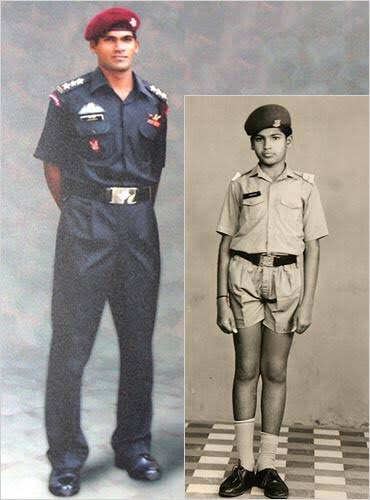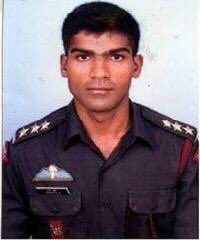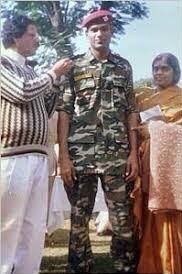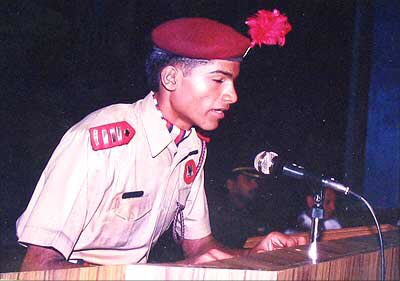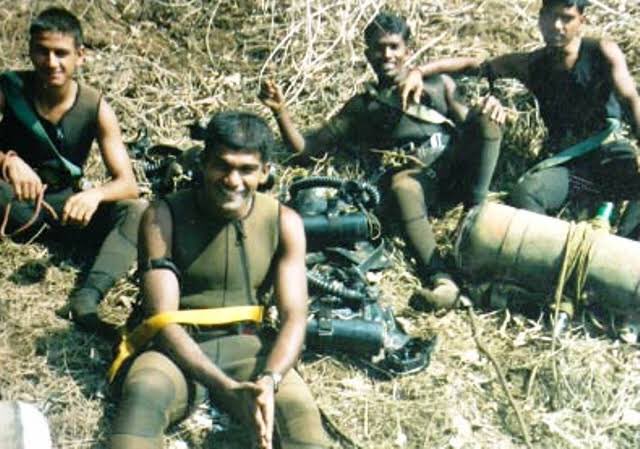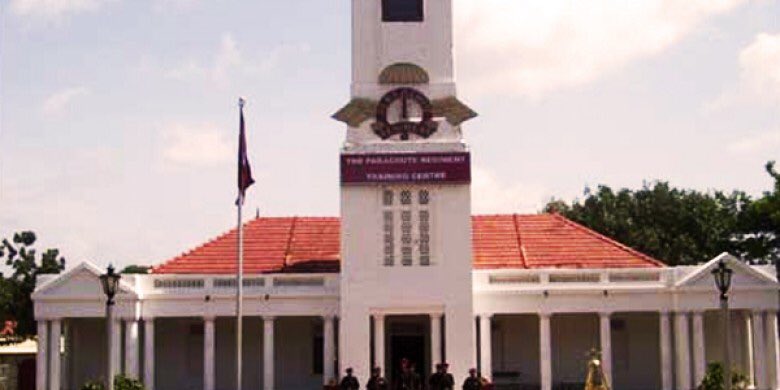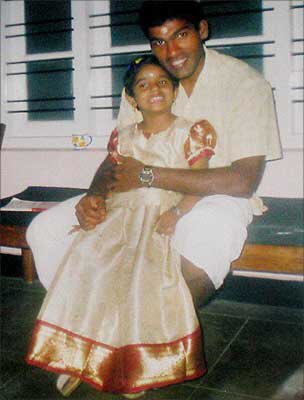Captain R Harshan, AC(P)
‘Amma, look at the names of the soldiers who have laid down their lives for the country. Can you see the message to their mothers? That all mothers should be proud of their brave sons. Amma, you should also be a proud mother when my name appears here.'+
‘Amma, look at the names of the soldiers who have laid down their lives for the country. Can you see the message to their mothers? That all mothers should be proud of their brave sons. Amma, you should also be a proud mother when my name appears here.'+
Captain R Harshan, 2 Para(SF) lost his life fighting terrorists in Jammu and Kashmir on 20 March 2007.
He was just 26 years old.
For Harshan, joining the Indian Army was not a spur of the moment decision. It was a dream he carried from when he was 8 years old. +
He was just 26 years old.
For Harshan, joining the Indian Army was not a spur of the moment decision. It was a dream he carried from when he was 8 years old. +
After finishing the 4th standard, Harshan insisted he be admitted to the Sainik School. He took the all-India entrance examination for the 6th standard, and without going to the 5th, he joined the Sainik School at Kazhakoottam, Thiruvananthapuram, in the 6th standard.+
"I wanted to join the army but I was rejected at the interview level," said Harshan's father K Radhakrishnan Nair. "So, in a way, I would say I inspired him to join the defence services. With each passing day at Sainik School, his desire to wear the army uniform increased,"+
He was excellent in studies as well as extracurricular activities," remembers his mother Chitra. "There was no game that he did not play in school; he was the captain of the volleyball and basketball teams. He was an exceptionally good orator too,"+
Chitra remembers how Harshan would perch himself on the kitchen slab near the stove, narrating all the stories to his mother and aunt when he came home on holidays from school.
"Because he was away from us at the Sainik School from a very young age, he was very special to us.”
"Because he was away from us at the Sainik School from a very young age, he was very special to us.”
Harshan always wanted to lead. In the 12th standard, he became the school captain. The same year, he was chosen as the best all-round cadet.
By the time he finished school, he had read all the war books he could lay his hands on.+
By the time he finished school, he had read all the war books he could lay his hands on.+
Joining the National Defence Academy was Harshan's dream. When he failed in the NDA interview, he was shattered.
Though he was ashamed and unhappy, he obeyed his father and took the engineering entrance examination. He succeeded with flying colours. But even as he studied to be+
Though he was ashamed and unhappy, he obeyed his father and took the engineering entrance examination. He succeeded with flying colours. But even as he studied to be+
an engineer, his mind was elsewhere.
Without telling his father, he applied again to the NDA. He broke the news to his father only after he was selected. But his father would not let him join the defence academy.+
Without telling his father, he applied again to the NDA. He broke the news to his father only after he was selected. But his father would not let him join the defence academy.+
"I told him to complete engineering and then join the army," says Radhakrishnan Nair. "But he was insistent. I even requested a wing commander to persuade him to complete his engineering degree.+
After talking with Harshan for an hour, the officer told me, 'If you want your son to be happy, let him join the NDA.' So, I agreed."
After passing out of NDA, Harshan joined the Indian Military Academy in Dehradun.+
After passing out of NDA, Harshan joined the Indian Military Academy in Dehradun.+
At the IMA passing out ceremony, Harshan's parents felt proud seeing their son in uniform. "Parents, if alive, have to fix the stars on the officer's shoulder straps. It was a proud moment for both of us when we did that," says Radhakrishnan Nair.+
What surprised and worried the father was his son choosing to be a paratrooper, the toughest unit. His mother already knew what he was planning to do.
"For three years, he was telling me he wanted to be a paratrooper," recalls Chitra. "He wanted me to pray for him so that he+
"For three years, he was telling me he wanted to be a paratrooper," recalls Chitra. "He wanted me to pray for him so that he+
got into the elite wing. I didn't know how dangerous it was."
Because of his performance at the Sainik School and at the NDA, Harshan was selected for the special paratrooper unit. In 2002, he became a lieutenant in the elite 2 Parachute Regiment.+
Because of his performance at the Sainik School and at the NDA, Harshan was selected for the special paratrooper unit. In 2002, he became a lieutenant in the elite 2 Parachute Regiment.+
He completed his training in Kashmir in record time and was posted to the regiment base in Agra.
He was one of six young officers sent to Israel for special weapons training.
In 2006, Harshan was posted in Kashmir. He was delighted.
But his parents were worried.+
He was one of six young officers sent to Israel for special weapons training.
In 2006, Harshan was posted in Kashmir. He was delighted.
But his parents were worried.+
Every evening after coming back from office, the first thing Nair would ask Chitra if there was a call from Harshan that day.
"He used to call us regularly but as he was not supposed to reveal where he was, he couldn't tell us anything about his operations or whereabouts," said+
"He used to call us regularly but as he was not supposed to reveal where he was, he couldn't tell us anything about his operations or whereabouts," said+
Nair. "We sensed that he was very enthusiastic about his days as an officer in Kashmir. The way he conducted his last operation also shows he didn't care about his life at all."
On March 7, there was an operation in Baramulla, Kashmir, where Captain Harshan, a member of the+
On March 7, there was an operation in Baramulla, Kashmir, where Captain Harshan, a member of the+
elite Red Devil unit, overpowered a dreaded terrorist and recovered a cache of weapons from him. After the operation the unit recommended Harshan's name for a gallantry award.
While interrogating captured terrorists, Harshan found out they were infiltrating into India through+
While interrogating captured terrorists, Harshan found out they were infiltrating into India through+
Kupwara. He told his senior officers that he wanted to go after them. For the next two weeks, he was at Kupwara, but could not find any terrorists.
He decided to apply for leave and come home.
On March 20, the day he had packed up to leave, he heard that some terrorists had+
He decided to apply for leave and come home.
On March 20, the day he had packed up to leave, he heard that some terrorists had+
been sighted at Kupwara. Immediately, he took 20 men with him and travelled there.
After successfully completing the mission, as he was coming down, he was fired at from behind the bushes. A bullet hit him on the thigh. He fired back. A gunbattle ensued.+
After successfully completing the mission, as he was coming down, he was fired at from behind the bushes. A bullet hit him on the thigh. He fired back. A gunbattle ensued.+
Although he was injured badly, Harshan took charge of the situation, killed 3 terrorists & saved the lives of his men. But a bullet from a terrorist hit him in the neck.
Capt Harshan breathed his last on the borders of the country, protecting India from the menace of terrorism.+
Capt Harshan breathed his last on the borders of the country, protecting India from the menace of terrorism.+
The 2 Parachute Regiment called Vyasan, who was eagerly waiting to see his brother, and conveyed the news of Harshan's death. Vyasan didn't know how to break the news to his parents, who were waiting for their soldier son to come home.+
At home, his parents and aunt Vijayambika were counting the minutes to Harshan's arrival. A day before his death, Harshan had called his aunt in her office and told her: 'Kunjamma, I am starting tomorrow. I will see Vyasan first and then come there.'+
"The next day, Vyasan called me to break the sad news," said Vijayambika. "Before he could say anything, I told him about Harshan's call the earlier day. Harshan was unable to contact him and had asked me to call him. Vyasan disconnected the phone, unwilling to break the news to+
me. He then called my husband. Harshan was like my own son..."
Instead of a young man full of life, what came home was Harshan's dead body.+
Instead of a young man full of life, what came home was Harshan's dead body.+
At the IMA passing out ceremony, Harshan showed his parents the large number of civilian visitors, and told them, 'Only you two have come to see me get my commission, but from the northern parts of India, entire villages come.'+
His soul might have felt gratified to see the entire capital of Kerala joining the grieving parents. As his body was carried from the airport to his house, thousands of people thronged the road, many women with lit candles waiting to catching a glimpse of the brave soldier.+
One of their own who had laid down his life for them, for the country.
Chitra cannot forget an incident that happened while she was at the IMA. Harshan took her to the Bali Dan Mandir there and said, 'Amma, look at the names of the soldiers who have laid down their lives for the
Chitra cannot forget an incident that happened while she was at the IMA. Harshan took her to the Bali Dan Mandir there and said, 'Amma, look at the names of the soldiers who have laid down their lives for the
country. Can you see the message to their mothers? That all mothers should be proud of their brave sons. Amma, you should also be a proud mother when my name appears here.'
Captain Harshan became the youngest officer to receive Ashok Chakra posthumously in Independent India.
Captain Harshan became the youngest officer to receive Ashok Chakra posthumously in Independent India.

 Read on Twitter
Read on Twitter